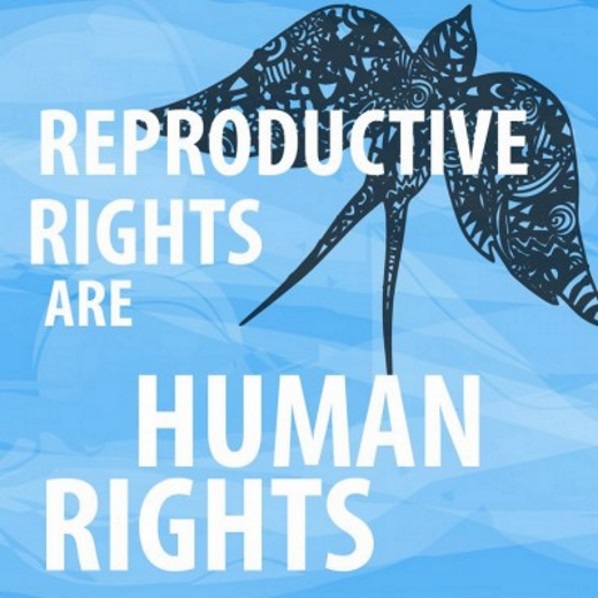
An image widely shared on the web, promoting reproductive rights as human rights.
The status of women's reproductive rights have been a subject of concern recently in Croatia. A protest organised in Zagreb, Croatia declared “Illegal abortions – we won't go back” on 28 November, and on 11 December a joint meeting of The Committee for Gender Equality and CESI (Center for Education, Counseling and Research) was held regarding reproductive rights in Croatia.
Those two events occurred after the mass media started asking questions around the topic, provoked by independent activist portals like Libela.org (which is the only portal in Croatia constantly writing about reproductive rights) and research done and published by CESI — “Grey area – question of abortions in Republic of Croatia”. In Croatia, women have been able to have abortions, with no questions asked until the tenth week of pregnancy since 1978, thanks to a law that was instated while Croatia was still a part of the former Yugoslavia and has been valid since.
Over the last 23 years, since Croatia's independence, several religious and neo-conservative groups have tried to oppose such laws and forbid legally induced abortions. None of them have, for the time being, tried to put pressure on legislators in a way that would actually ban abortions altogether, although many have organized protests and anti-freedom-of-choice campaigns like “40 days for life”. None of the organizations rallying against women's rights have discussed contraception, education, and social-economic factors involved in abortion rates and practices.
There is no institutional sexual education in schools, and the groups that are “praying for life” are opposed to introducing education on the matter and expanding basic knowledge of reproductive rights and contraception in the country. Such actions have only raised the stigma and shame directed at women who have decided to have an abortion.
An even bigger threat to women's reproductive rights in Croatia is conscientious objection, which allows gynecologists to choose not to perform abortions and amniocentesis, subscribe contraception, or some aspects of medically aided fertilization. If the procedures regarding female sexual health aren't reconciled with his or her moral grounds, he or she is then allowed to deny performing them.

Pro-choice protesters gathered in Zagreb on November 28, 2014, carrying a banner that reads: “We don't want to go back to illegal abortions”. Photo by Center for Civic Courage, used with permission.
Considering that the Croatian health system is on the verge of collapsing, due to outdated systems and new reforms, and because of an unstable economy, many women simply aren’t in the financial situation to ask for healthcare in private institutions of their choice. This has created a situation in which women simply aren’t allowed to make decisions about their own bodies.
Because elective abortion isn’t part of the basic national healthcare program, prices generally range from 100 euros to 400 euros (about 124 to 500 US dollars). In some cases, hospital boards have gone as far as to decide not to perform abortions in their institutions, which is a direct violation of existing laws, but authorities have let such decisions slide.
Recently, the Ministry of Health has made some improvements and obligations that induced abortion will be available as a medical service in every hospital which has a gynecology department. Nevertheless, while attempting to create access to legal abortions, the same ministry is allowing Sv. Duh from Zagreb to be exempt from that obligation. Although Croatia is a secular state, the Catholic Church in Croatia still has extreme influence in creating laws and opinions.
Last year, 3,816 induced abortions were performed in Croatia, which make up only 35% of all abortions in 2013 in the country. Another 65% were medically necessary abortions due to malformations or other medical reasons. These statistics do not paint an entirely true picture, because pro-choice activists in Croatia have noticed that some of the abortions are performed outside of medical institutions equipped for performing them and some procedures get registered other medical conditions.
Although in 2014 the Croatian government granted “fast internet connection” of 1Mb/s, allegedly allowing more access and freedom of information, Croatia is still coping with low GDPs, high unemployment rates, growing nationalistic tendencies, including extreme religious influence in society and state affairs, and regression regarding woman’s reproductive rights and health issues.







8 comments
What a load of tosh. Almost nothing from this article is even remotely true. Aside from the fact that Croatia/Hrvatska exists as a country and the point about the 1978 law.
It is advisable that you stop lying and stop being disingenuous. It helps nobody.
I’m sorry that you have issues with misandry (and I don’t blame you for that, but not every feminist is a misandrist) and I didn’t use a single word to promote it. Romania isn’t Croatia. I don’t know what are the problems that women are coping with in your country, but this is what bothers Croatian women. Maybe you shoud click on those links and check for yourself.
Trolls aren’t cool, you know.
Just wondering, on what do you base the statement that almost nothing from the article is true?
Because, reality doesn’t agree with you.
Lucian, it is true, you want to believe it or not.
Indeed, abortions should be as commonplace as possible. One-night stand resulting in a pregnancy? No bother, the parasite can end up in the biological waste where it rightly belongs – in a matter of minutes. Father’s feelings? Berate the misogynist pig for even trying to express them. He doesn’t even need to know, really. An ideal, progressive world.